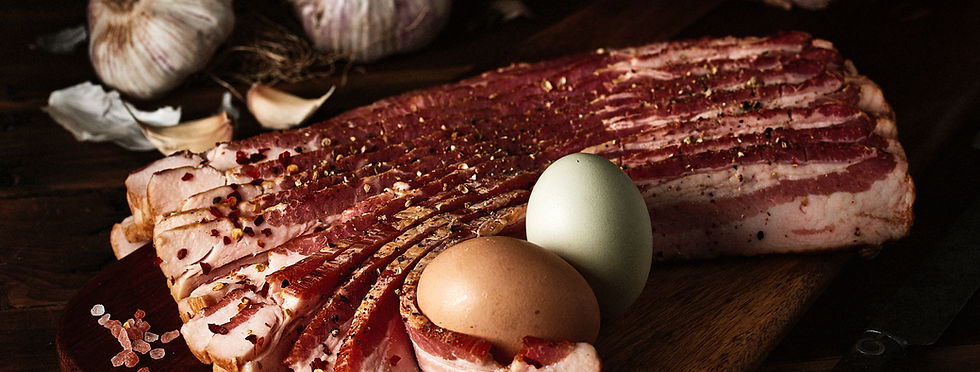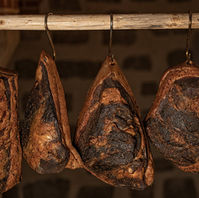NEWS & MEDIA
Simplifying complexity – empowering people.
INTO THE FUTURE, WITH INTUITION
From automation to AI, meat producers around the world are facing similar challenges. However, local conditions could hardly be more different. In Africa, for instance, automated systems are bridging the gap between culture, training, and equipment.
DISCOVER THE HISTORY OF MEAT PROCESSING!
EarthwormExpress is a leading blog on meat science and technology. It covers topics from the history of meat processing to modern innovations, combining solid research with industry insight.
Described as an “outstanding blog in meat science and technology,” it offers a unique view of the meat industry’s past, present, and future.
Author Eben van Tonder dedicates it to all who love meat as food and as science.
BACON AND THE ART OF LIVING!
For us, bacon is more than just meat. It’s memory, craftsmanship, and living culture. Bacon Stories shares the people, places, and decades of passion behind every slice. From the smoky aroma of Alpine curing rooms to the modern production halls of West Africa, ancient techniques meet scientific precision and relentless dedication.
Christa recalls her childhood on an Austrian mountain farm, where bacon was part of daily life. Eben tells of his 23-year journey to a breakthrough method for reformed bacon. Two worlds, united by one love: bacon that tells a story.
BACON STORIES

Bacon Stories
Eben' s Bacon Story
The 23-Year Journey to Perfect Reformed Bacon
How an ancient art, a relentless pursuit, and a partnership forged across continents gave rise to a breakthrough in modern meat processing
By Eben van Tonder, 14 June 2025
Introduction Some stories take a year to unfold and some take a lifetime. This is the story of reformed bacon, not just as a product category but as a calling. It is the story of a dream pursued over two decades, through failure, loss and rediscovery, until one day under the heavy clouds of a Nigerian storm it finally came together. The Difference Between Formed and Reformed Bacon In the world of processed meats, formed bacon refers to bacon shaped into regular logs using moulds or grids. It is a standard industrial technique. Reformed bacon is more ambitious. It takes small pieces of meat, trim and offcuts and fuses them into a single cohesive log that behaves like whole-muscle bacon. Done well, it holds together in the pan, slices cleanly and delivers a balanced ratio of fat and lean. What many do not realise is that the science behind this is ancient. Long before binding proteins were studied in labs, pressing and binding meat was used in European peasant kitchens and later codified in the monastic traditions of Austria and Germany. The basic process behind pressed ham is nearly identical to that of reformed bacon, with longer cooking. The tools have changed from wooden forms, knives, mortars and pestles to grinders, emulsifiers, stainless-steel moulds and industrial smoking chambers. The essence remains the same. A Personal Obsession Begins My own obsession with reformed bacon began in the early 2000s. I was convinced it was possible to create a perfect restructured meat product that would not break when removed from its packaging, that would hold its shape in the pan and that would taste better than the sum of its parts. Oscar and I had just launched Woody’s Consumer Brands. With support from Profet I travelled to England for almost a year to collaborate with British producers and explore available technologies. We had the drive and the vision, but the project failed. Not a single objective was met. Woody’s shifted to producing ordinary bacon at scale, yet I did not abandon the dream of reformed bacon. Over the following years I went deeper into the science, examining protein mechanics, pH effects, amino acid interactions and the roles of heat, cold and mechanical action. The body of knowledge was overwhelming. I did not realise how much I would need to master before returning to the work we began in 2011, when I first launched the reformed bacon project. A Turning Point in Austria The turning point came with Christa Berger. Trained in cultural anthropology and raised in the Alps, she respects both ancient traditions and modern food processing and developed a strong understanding of meat-curing heritage. Christa introduced me to archives and practical knowledge in Austria’s monastic institutions, repositories of meat-science techniques preserved across centuries. We began working with the Almi spice company and their exceptional team of young scientists. The project regained shape. Concepts I had explored 10 to 20 years earlier resurfaced and combined in new ways. Christa and I spoke every evening, working through technical hypotheses, testing theories and connecting dots. In Nigeria, where I could work beyond the gaze of corporate processors, I started testing our emerging theories. A week ago I told Christa that although I liked our direction, I disagreed with a core mechanism in mainstream reformed-bacon theory. She listened and replied calmly: “Of course the theory is wrong. A better approach would be a, b and c.” That night the solution was born. Breakthrough in Nigeria The next morning I implemented two variations of Christa’s insight. One worked brilliantly. For the first time the product held. My focus was not colour or flavour. It was binding, weight loss and slicability. The product needed to perform like pressed ham, sliceable on a ham slicer at ambient temperature with minimal structural loss. It required more attention to detail than any other product I have developed. Every factor, from hydration technique to mechanical treatment, had to be re-examined and perfected. After 23 years I finally had something I was proud of. The Cost of the Journey Last night I became sentimental. I thought about my mother, her descent into dementia and Alzheimer’s during these years and her final days, which I missed while travelling in Nigeria. I remembered the last gatherings with my brothers and our children. I looked at photos of the kids growing up. Tristan and Lauren once joked that they would inscribe on my gravestone: “Our Dad Tried.” They grew up watching me return home week after week without the breakthrough I was chasing. When I met Christa our earliest conversations were about salt and ancient curing. I once told her that the structure and clarity she brings into my life might be the key to pulling together the strands of my work and my identity. That proved true. A woman raised in an Alpine farming village helped me unlock what I could not achieve in 23 years of effort. And as we laughed last night, I realised this journey has been the equivalent of a university degree. The learning has been immense. A Slice and a Storm This morning, with torrential West African storms pounding the coastline, I stood in the factory and ate a warm, flavourful slice of reformed bacon for breakfast. I thought about the failures, the friendships, the science, the monks, the factories and the years. And I smiled. It was worth it. Every single step.
Kristi's Bacon Story
How It Used to Be When I Was Little
Hard work, cold winters, and the daily enjoyment of bacon shaped a childhood rooted in Alpine farm heritage
By Christa Berger, 25 May 2025
Mornings on the Farm The day started early on the farm in the last foothills of the Alps in eastern Austria. My parents got up, dressed, and went straight to the barn to milk, muck out, and feed the animals. In winter, when it snowed and the icy wind whistled down from the mountain, they wrapped themselves in warm clothes and enjoyed the warmth of the animals in the barn. We had about 25 dairy cows, several bulls, and a few calves, as well as pigs, chickens, and a horse. Helping Out as Children When we were old enough, we helped out when we didn't have school. Our tasks included grooming the cows, mucking out, sweeping the aisles, cleaning the feed troughs, and refilling them with fresh feed. Grandpa accompanied us. In the hayloft, straw and hay were stored, which we could throw through a hole in the floor into the aisle in front of the cattle using a pitchfork. Once, my sister fell through such a hole and broke her leg. Evening Chores and the Taste of Bacon Bread In the evening, it was our job to fill the milk from the tank into cans so it could be taken to the collection point in the morning. Afterwards, the milking room had to be thoroughly cleaned with a broom and water jet. By the age of 13, my little sister, my two-year-older cousin, and I could already milk and handle all barn work independently. After that, the bacon bread tasted especially good. Early Rising and School Snacks Usually, my parents were in the barn by six o'clock at the latest. We children also had to get up early because our farm was on a mountain and we had a long way to school. Grandma helped us get ready for school: washing, dressing, combing, and braiding our hair. She also prepared our school snack, which, as you might guess, was often a bacon sandwich. She cut the bacon into fine rectangular strips, salted and peppered them. At school, I had to be careful while eating because these small bacon strips wanted to fall out of the bread. When my parents came back from the barn, after about an hour and a half of work, there was coffee, a buttered slice of bread, and often homemade jam, but by then we were already on our way to school. Daily Work and the Importance of Bacon Then they went back out to continue working in the fields, the forest, the orchard, the hayloft, or the barn. The work was hard and physically demanding. At half past nine, they came back in for their second breakfast: homemade bacon, freshly baked sourdough bread, and cider. Especially during heavy labor, bacon was indispensable, not only tasty but also strengthening. As luck would have it, the mailman arrived at exactly the same time in the morning and enjoyed a good piece of bacon and a glass of cider with the family. Bacon was simply part of our daily life. Meals in the Forest and Long Working Hours When my father went into the forest with the men, it often meant they wouldn't return until evening because some of our forests were high up the mountain. They took their provisions with them, and bacon was always included. In the afternoon, my mother and we children would follow and bring them hot coffee and a pastry, such as a nut cake, to the clearing. Generally, the men worked in the evenings until they were exhausted. In summer this was always until there was no more light outside, sometimes until eleven o'clock at night. Later, my father also ran a custom threshing business, and since the combine harvesters had headlights, he could work even longer. I remember that he sometimes came to our beds completely dusty after midnight, very hungry and exhausted, to quietly say good night. He was glad when all the machines worked and he could successfully complete all the day's tasks. My mother always waited for my father until he finally came home, and then she prepared a small supper for him and the hungry drivers, for example an omelet with bacon. Learning Household Skills and Sunday Meals Young girls usually attended a domestic science school during their compulsory schooling to prepare for marriage. Since my sister wanted to become a kindergarten teacher and I wanted to become a teacher, we attended a higher school. Grandma and my mother therefore decided that we had to learn at home what we missed in household management at school. Every third Sunday, my sister and I were responsible for preparing the meal and setting the Sunday table while everyone else went to church, and in this way we learned very early to cook and handle food. Of course, bacon wasn't just an everyday snack. It was also on the menu on Sundays and holidays, for example as a side dish to roast beef in the form of bacon beans, which were very popular at our home. During the week, we often ate bacon dumplings or cabbage noodles with bacon. Summer Duties and Father's Love for Work In summer, while the parents were in the barn, we children had to handle the phone and take calls from customers who had ripe crops and needed one of our combine harvesters. We had to write down names and phone numbers and note the expected day of harvest readiness. If bad weather was forecast, the phone rang incessantly because everyone wanted to get the grain in before it got wet. When Dad came from the barn and had eaten his scrambled eggs with bacon, he called everyone back and planned his appointments. On days when he knew he wouldn't be home for lunch, there was a more substantial breakfast. Father's Dedication and Bacon Tradition My father loved work, and there was always something to be done. For him, work was an essential part of life and a source of satisfaction, not merely a duty. I am very grateful that he instilled this attitude in me and passed on his love for our bacon tradition, just as I pass it on to my children.
























